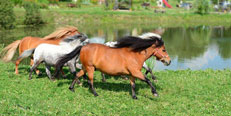 By Bill Jackson
By Bill Jackson
bjackson@greeleytribune.com
Six additional horses in Weld and three other counties are showing signs of equine herpesvirus — EHV-1 — according to the Colorado Department of Agriculture. Colorado State University on Monday announced precautions against the disease and canceled events planned at its equine sciences center.
The disease was previously confirmed in two horses in Weld County. EHV-1 can be treated if caught early enough, but is fatal in some cases. It can transfer from nose-to-nose contact among horses and can be spread by contaminated tack, equipment and people’s clothing.
Dr. Wade Shoemaker of the Countryside Large Animal Clinic of Greeley, said he has been going non-stop for the past three days, answering questions and treating horses in Weld County that have showed signs of the disease. He had to euthanize one infected horse, but he said the other is showing signs of recovery.
The agriculture department said Monday afternoon six additional horses are showing signs of the disease. Horses in Boulder, Larimer, Mesa and Weld counties are being tested for the disease and are under hold or quarantine orders. A second horse was euthanized with similar symptoms, but test results have not confirmed EHV-1.
The two Weld horses confirmed with the disease had attended the National Cutting Horse Association’s Western Horse Championships in Ogden, Utah. The CDA is working with the Utah State Veterinarian to try to determine the point of the infection. That investigation is ongoing.
Christi Lightcap, spokeswoman with the Colorado department, said information about infected horses is confidential and the owners’ names will not be released.
A high temperature along with limb weakness in the rear legs and a lack of coordination are the initial signs a horse is infected, Shoemaker said.
“It is treatable to some degree, if we catch it early,” Shoemaker said. The horse that was euthanized, he said, was fine at evening feeding, showed initial signs at about 7 a.m. the next day, was treated by 10 a.m., but had to be put down that evening.
Like any disease, he said, it affects different horses in different ways. Other horses he has treated, “were looking wonderful in 48 hours after treatment started.”
They are treated, he added, with human anti-viral drugs that are not inexpensive.
“Some horses are not able to return to their full athletic ability following treatment, but in reality, most will recover fully within 30 days,” he said.
Colorado State’s Veterinary Teaching Hospital is restricting non-emergency equine veterinary appointments as a precaution against the disease, according to a news release from the university.
CSU has also canceled a two-day jumping clinic scheduled today and Wednesday and a two-day western reining event scheduled May 21-22. Officials, according to the news release, have not yet determined whether horse camps for young riders, scheduled June 13-18 and July 19-24, will go on as planned.
In addition, CSU’s Equine Sciences Center on the foothills campus has temporarily closed its doors to horses entering or leaving the center. The length of the restriction is not known and will depend on the course the outbreak takes.
The agriculture department is urging anyone who attended the event in Utah to notify their veterinarian and isolate and monitor horses for clinical signs of the disease. Some horses may not show signs of the disease but could be a carrier.
“The disease can have tremendous effects on the horse community and I encourage horse owners to be vigilant about the disease prevention methods they use within their premises,” Dr. Keith Roeher said in the news release. He is the state veterinarian.
“Colorado livestock owners have always been diligent about protecting the health of their animals and this is an important time to continue or implement proper biosecurity practices,” he said.